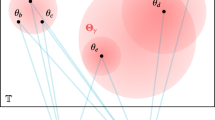Abstract
This paper considers how to best relate the competing accounts of scientific knowledge that Russell and Reichenbach proposed in the 1930s and 1940s. At the heart of their disagreements are two different accounts of how to best combine a theory of knowledge with scientific realism. Reichenbach argued that a broadly empiricist epistemology should be based on decisions. These decisions or “posits” informed Reichenbach’s defense of induction and a corresponding conception of what knowledge required. Russell maintained that a scientific realist must abandon empiricism in favor of knowledge of some non-demonstrative principles with a non-empirical basis. After identifying the best versions of realism offered by Reichenbach and Russell, the paper concludes with a brief discussion of the limitations of these two approaches.
Similar content being viewed by others
Notes
Russell to Reichenbach, Sept. 6, 1940 (Bertrand Russell Archives, 53895 RA3 17K).
See also Dalkey’s description of H. Reichenbach’s “stereo pictures” and the summer of 1940 spent with Russell’s family, with visits by Reichenbach (1978, I, p. 50).
Cf. Schott’s recollection that Reichenbach “used such images to demonstrate that visual perception is not just a matter of retinal images” (Reichenbach 1978, I, p. 53).
I am grateful to an anonymous referee for drawing this paper to my attention. See also Shaffer (2017).
This is perhaps a continuation of the debate about perception from 1940 that was noted in Sect. 2.
See also Salmon’s recollection in Reichenbach (1978, I, p. 73).
See also Reichenbach (1949b). Russell wrote a brief letter in response to Reichenbach, dated 1949/4/22. He concedes one “mathematical error” in an objection to Reichenbach that we have not discussed, but adds that “most of the other points seem more capable of being argued” (Bertrand Russell Archives 53900 RA3 17K).
See also Eberhart and Glymour (2011). They note that Reichenbach offered an explicit response to Goodman (1947) in the revised English edition of his Theory of Probability (1949a, pp. 448–450), but complain that this response “makes no sense” (2011, p. 384). Reichenbach’s published reply to Goodman is very similar to his response to Russell.
References
Chakravartty, A. (2017). Scientific ontology: Integrating naturalized metaphysics and voluntarist epistemology. Oxford: Oxford University Press.
Eberhart, F., & Glymour, C. (2011). Hans Reichenbach’s probability logic. In D. M. Gabbay, S. Hartmann, & J. Woods (Eds.), Handbook of the history of logic, Vol. 10: Inductive Logic. (pp. 357–389). Amsterdam: Elsevier.
Godden, D. (2014). Mill’s System of Logic. In W. J. Mander (Ed.), Oxford handbook of British philosophy in the nineteenth century. (pp. 44–70). Oxford: Oxford University Press.
Goodman, N. (1946). A query on confirmation. Journal of Philosophy, 43, 383–385
Goodman, N. (1947). The problem of counterfactual conditionals. Journal of Philosophy, 44, 113–128
Goodman, N. (1983). Fact, fiction and forecast, Fourth Edition. Harvard University Press.
Grayling, A. C. (2003). Russell, experience, and the roots of science. In N. Griffin (Ed.), The Cambridge companion to Russell. (pp. 449–474). Cambridge University Press.
Johnsen, B. (1979). Russell’s new riddle of induction. Philosophy, 54, 87–97
Milkov, N. (2013). The Berlin Group and the Vienna Circle: Affinities and divergences. In N. Milkov & V. Peckhaus (Eds.), The Berlin Group and the philosophy of logical empiricism. (pp. 3–32). Berlin: Springer.
Neuber, M. (2018). Der Realismus im logischen Empirismus: eine Studie zur Geschichte der Wissenschaftsphilosophie. Springer.
Patton, L. (2017). Russell’s method of analysis and the axioms of mathematics. In S. Lapointe & C. Pincock (Eds.), Innovations in the history of analytic philosophy. (pp. 105–126). London: Palgrave Macmillan.
Psillos, S. (2011a). On Reichenbach’s argument for scientific realism. Synthese, 181, 23–40
Psillos, S. (2011b). Choosing the realist framework. Synthese, 180, 301–316
Reichenbach, H. (1938). Experience and prediction: An analysis of the foundations and the structure of knowledge. Chicago: University of Chicago Press.
Reichenbach, H. (1949a). The Theory of Probability. E. H. Hutton & M. Reichenbach (trans.). University of California Press.
Reichenbach, H. (1949b). A conversation between Bertrand Russell and David Hume. Journal of Philosophy, 46, 545–549.
Reichenbach, H. (1967). An Early Appreciation. M. Reichenbach (trans.). In R. Schoenman (Ed.), Bertrand Russell: Philosopher of the century (pp. 129–133). Allen & Unwin.
Reichenbach, H. (1978). Selected Writings, 1908–1953. 2 volumes. M. Reichenbach & R. S. Cohen (Eds.). Boston, MA: D. Reidel.
Russell, B. (1927). An Outline of Philosophy. 1993 reprint, Routledge.
Russell, B. (1940). Inquiry into Meaning and Truth. Norton.
Russell, B. (1948). Human knowledge: Its scope and limits. New York: Simon and Schuster.
Russell, B. (1996). A Fresh Look at Empiricism, 1927–1946. The Collected Papers of Bertrand Russell, Vol. 10. J. Slater (Ed.). Routledge.
Russell, B. (1997). Last Philosophical Testament, 1947–1968. The Collected Papers of Bertrand Russell, Vol. 11. J. Slater (Ed.). Routledge.
Schilpp, P. (Ed.). (1944). The Philosophy of Bertrand Russell. Open Court.
Shaffer, M. (2017). Grounding Reichenbach’s pragmatic vindication of induction. Polish Journal of Philosophy, 11, 43–55
Shaffer, M. (2019). Reichenbach, Russell and the metaphysics of induction. Argumenta, 4, 161–181
Sober, E. (2011). Reichenbach’s cubical universe and the problem of the external world. Synthese, 181, 3–21
Stevens, G. (2011). Russell on non-demonstrative inference. In D. Dieks, et al. (Ed.), Explanation, prediction, and confirmation. (pp. 511–520). Springer.
Acknowledgements
An earlier version of this paper was presented at the Workshop on the History of Analytic Philosophy, Université Clermont-Auvergne, Clermont-Ferrand, France, May 2019. I am grateful to the audience for their helpful suggestions, especially Sébastien Gandon and Henri Galinon. I would also like to thank Alexander Klein for his assistance in obtaining the correspondence between Russell and Reichenbach. Two anonymous referees offered very helpful suggestions for how to improve this paper.
Author information
Authors and Affiliations
Corresponding author
Additional information
Publisher's Note
Springer Nature remains neutral with regard to jurisdictional claims in published maps and institutional affiliations.
This article belongs to the topical collection on All Things Reichenbach, edited by Erik Curiel and Flavia Padovani.
Rights and permissions
About this article
Cite this article
Pincock, C. Reichenbach, Russell and scientific realism. Synthese 199, 8485–8506 (2021). https://doi.org/10.1007/s11229-021-03172-x
Received:
Accepted:
Published:
Issue Date:
DOI: https://doi.org/10.1007/s11229-021-03172-x



